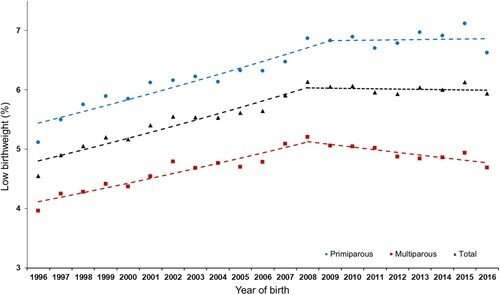Scientist predicts emotional stress caused by COVID-19 will lead to smaller babies being born

Being pregnant is a wonderful experience, but at the same it can be incredibly stressful—throw a global pandemic into the mix and those nine months may see an expecting mother go from happy and joyful, to fearful and concerned.
The impact of chronic emotional stress on human growth has been investigated by scientists for decades, with many studies specifically focusing on how the birth weight of babies is impacted as this is one of the key predictors of health risks at birth and in later life.
The consequences of low birth weight—defined as a weight of less than 2500 grams for a pregnancy duration between 37-42 weeks (weight adjusted for shorter pregnancies)—include an increased risk of: infection; poor learning and school performance; psychological problems; reduced adult earnings; adult overweight, diabetes, and heart disease; and, on average, an earlier age at death, say researchers.
Emeritus Professor Barry Bogin, an expert in Biological Anthropology in the School of Sport, Exercise and Health Sciences, has reviewed previous biocultural studies—including his analysis of changes in birth weight related to the 2008 financial crisis in Spain—to predict how COVID-19 will impact the birth weight of the next generation. The biocultural approach considers how social and emotional factors interact and impact human biology.
His predictions and reasonings feature in a forthcoming special issue on the COVID-19 pandemic in the American Journal of Human Biology. Professor Bogin’s invited commentary– a journal piece that encourages further exchange of ideas in the research community—is co-authored with Dr. Carlos Varea, of Madrid Autonomous University, the principal investigator on the Spanish birth weight project.
The pair predict that “it will take two or more generations to assess the biocultural consequences of the COVID‐19 crisis on people—from fetuses to the aged.”
However, “one may hypothesize that for the immediate future there will be a global rise in maternal emotional stress and a decline in birth weight.”
Reaching this conclusion
At some point or another, you may have told a pregnant woman to stay relaxed or to not get stressed due to concerns that a flare in emotions may impact their unborn baby, and you are correct to believe that extreme psychological stress can have a biological/physical impact.
Professor Bogin and Dr. Varea explain in their commentary how chronic stress can lead to a variety of different biological changes in the body—ranging from cellular-level tweaks to altering hormone levels.
They define chronic stress as insecurity related to money, housing, social support. It includes worry about job loss, loss of benefits, loss of a partner, or loss of housing.
The pair explored the link between maternal stress and birth weight by reviewing “eight cohort studies with about 8,271 pregnant women and 1,081,151 children.”
They found “there was a statistically significant association between antenatal stress exposure and increasing rates of low birth weight” and conclude the “fundamental message from this review is maternal stress lowers birth weight.”
The scientists also cite the findings of their Spanish birth weight project [focused on the 2008 financial crisis] in support of their hypothesis that COVID-19 will lead to lower birth weights as a result of a rise in maternal stress.
“We reported a decline in birth weight across virtually all maternal social‐economic groups in Spain in the years leading up to, and especially, during the financial crisis,” write Professor Bogin and Dr. Varea.
“Our findings are supported by studies reporting reduced birth weight in Portugal, Iceland, Japan, and Greece during the 2008 banking system crisis, which was a global financial pandemic.”
Of the need to look at COVID-19 through a biocultural perspective, Professor Bogin and Dr. Varea said: “Fear of pandemic disease spreads as fast and as deep as the disease itself. The fear plays‐out in in many ways, from extremes of paranoia and violence, to xenophobia, closed borders, economic lockdowns, and social distancing. The fear pervades every level of society. The fear causes emotional stress. Chronic emotional stress—from insecurity that lasts for months or years—has biological impacts on people.”
They continued: “Pregnant women, their fetuses, and young people of all ages will suffer if exposed to chronic, toxic emotional stress. Chronic toxic stress takes a toll on human health, including the physical growth of people, as much as do food shortages and infection.”
Professor Bogin hopes the commentary will prompt biocultural studies on the impact of the COVID-19 pandemic that will lead to better understanding of the ways in which emotional stress affects not only pregnant women, but infants, children, teenagers and adults of all ages.
He also hopes it will encourage the government and health workers to provide additional support to expecting mothers.
Source: Read Full Article
